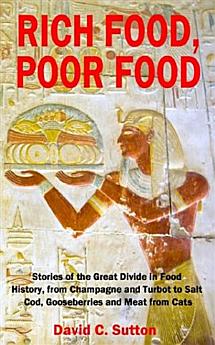Rich Food, Poor Food
พ.ย. 2017 · Chapelfields Press
eBook
195
หน้า
family_home
มีสิทธิ์
info
reportคะแนนและรีวิวไม่ได้รับการตรวจสอบยืนยัน ดูข้อมูลเพิ่มเติม
เกี่ยวกับ eBook เล่มนี้
Rich Food Poor Food is a study of the two food traditions in western society: the food eaten by rich people and the food eaten by poor people. It suggests that, until very recent times, the two traditions have rarely intersected.The book studies the gastronomy of the rich, with some extraordinary accounts of extravagant banquets, but also underlines that poor people had food preferences and pleasures which mattered greatly to them. It contrasts, for example, the turbot of the rich with the mackerel of the poor; the asparagus of the rich with the leeks of the poor; and the truffles of the rich with the mushrooms of the poor.Among the features of the book are its use of a wide range of food proverbs to illustrate its themes, and several humorous sections on the absurdities of etiquette in Western Europe in the past five hundred years - many of which survive to this day.
ให้คะแนน eBook นี้
แสดงความเห็นของคุณให้เรารับรู้
ข้อมูลในการอ่าน
สมาร์ทโฟนและแท็บเล็ต
ติดตั้งแอป Google Play Books สำหรับ Android และ iPad/iPhone แอปจะซิงค์โดยอัตโนมัติกับบัญชีของคุณ และช่วยให้คุณอ่านแบบออนไลน์หรือออฟไลน์ได้ทุกที่
แล็ปท็อปและคอมพิวเตอร์
คุณฟังหนังสือเสียงที่ซื้อจาก Google Play โดยใช้เว็บเบราว์เซอร์ในคอมพิวเตอร์ได้
eReader และอุปกรณ์อื่นๆ
หากต้องการอ่านบนอุปกรณ์ e-ink เช่น Kobo eReader คุณจะต้องดาวน์โหลดและโอนไฟล์ไปยังอุปกรณ์ของคุณ โปรดทำตามวิธีการอย่างละเอียดในศูนย์ช่วยเหลือเพื่อโอนไฟล์ไปยัง eReader ที่รองรับ




